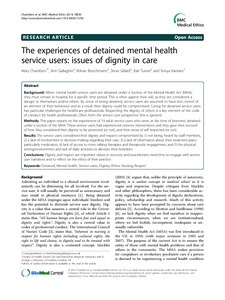Chambers, M; Gallagher, A; Borschmann, R; Gillard, S; Turner, K; Kantaris, X
(2014)
The experiences of detained mental health service users: issues of dignity in care.
BMC Medical Ethics, 15 (50).
ISSN 1472-6939
https://doi.org/10.1186/1472-6939-15-50
SGUL Authors: Gillard, Steven George
![[img]](https://openaccess.sgul.ac.uk/107236/1.hassmallThumbnailVersion/The_experience_detained_mental_health.pdf)  Preview |
|
["document_typename_application/pdf; charset=binary" not defined]
Published Version
Download (183kB)
| Preview
|
Abstract
BACKGROUND: When mental health service users are detained under a Section of the Mental Health Act (MHA), they must remain in hospital for a specific time period. This is often against their will, as they are considered a danger to themselves and/or others. By virtue of being detained, service users are assumed to have lost control of an element of their behaviour and as a result their dignity could be compromised. Caring for detained service users has particular challenges for healthcare professionals. Respecting the dignity of others is a key element of the code of conduct for health professionals. Often from the service user perspective this is ignored.
METHODS: This paper reports on the experiences of 19 adult service users who were, at the time of interview, detained under a Section of the MHA. These service users had experienced coercive interventions and they gave their account of how they considered their dignity to be protected (or not), and their sense of self respected (or not).
RESULTS: The service users considered their dignity and respect compromised by 1) not being 'heard' by staff members, 2) a lack of involvement in decision-making regarding their care, 3) a lack of information about their treatment plans particularly medication, 4) lack of access to more talking therapies and therapeutic engagement, and 5) the physical setting/environment and lack of daily activities to alleviate their boredom.
CONCLUSIONS: Dignity and respect are important values in recovery and practitioners need time to engage with service user narratives and to reflect on the ethics of their practice.
Statistics
Item downloaded times since 11 Dec 2014.
Actions (login required)
 |
Edit Item |



